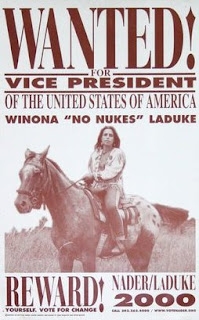I share today an op-ed I wrote over 20 years ago.
Published in the November 3-16, 2000 edition of Lavender magazine, this op-ed was in support of Green Party presidential candidate Ralph Nader.
My commentary was more than an attempt to get the Minnesota LGBTQI community on board with “Nader for President.” At a deeper level, it sought to shine a light on the underlying issues of corporate domination of our political system and the duplicity of both the Republican and Democratic parties in this domination, one that to this day continues to undermine and threaten our democracy.
Looking back on what I wrote, I must admit I’m somewhat in awe of how consistent I’ve been in my political perspective. It’s a radical perspective, to be sure. But radical in the best and truest sense of the word. [i]
Here’s how Nader talked about this same perspective in the context of his 2000 presidential campaign:
I’m running for President because concentrated corporate power is on a collision course with American democracy, and the voice of everyday citizens has been shut out of the political process. The Democratic and Republican parties have become Tweedle-Dum and Tweedle-Dee – one party with two heads, wearing different make-up – and taking their marching orders from the same corporate paymasters.
It’s no wonder that, years later, I would be such a passionate supporter of the presidential campaigns of both Bernie Sanders and Marianne Williamson. I share with them and with Nader the same perspective, one unapologetically grounded in the democractic and humanitarian principles upon which the U.S. was founded, principles that place people before corporate profits and thus call for big money out of politics.
This perspective, which in my case was born, in large part, from my late-1990s involvement in the Twin Cities’ justice and peace community, remains unchanged for me.
Twenty-two years on, I stand by every word I wrote in my Lavender commentary. At the time, many of my liberal friends were critical of my support for the Ralph Nader/Winona LaDuke [ii] ticket in the 2000 presidential election. And to this day there are many who blame Nader for George W. Bush’s election “win.” It's a charge that others compellingly refute.
Fight Fear – Vote Green!By Michael Bayly
Lavender
November 3-16, 2000
The experience of coming out is perhaps the most significant event in the lives of GLBT people. At the core of this transformative experience is the conscious decision to step beyond a fear-dominated, inauthentic existence and into a life in which one’s sexuality is positively integrated into all aspects of one’s being – a life filled with the promise of new beginnings and, accordingly, a life marked by a commitment to self-awareness, community-building, connection-making, and risk-taking.
In light of this awareness and experience gained from coming out, I was extremely dismayed and disappointed to read, especially during the week that included National Coming Out Day, the fear-induced commentary of editor Rudy Renaud regarding Ralph Nader’s presidential candidacy (Lavender, Oct. 6).
In terms of gay-specific issues, no candidate is more progressive than Nader, and no political party is more dedicated to GLBT issues than the Green Party. It’s that simple.
Renaud declares that, ultimately, what GLBT and other marginalized minorities want is equality. Yet socio-economic equality can only be cultivated in a climate of authentic democracy. Sadly, we presently do not have such a climate. What we have is a two-party system in which both parties have shamelessly sold out to profit-obsessed corporate interests. What we have, in other words, is a plutocracy.
Indeed, true democracy (the rule of the people) is the last thing those currently in power want as it is the ultimate threat to plutocracy (the rule of money). Accordingly, we can’t expect deliverance from the current state of socio-economic inequality by anyone whose vision is limited by the two-party system – be that person Republican or Democrat. Furthermore, we are not going to stem the downward spiral that such a system is fueling by fearfully choosing the lesser of two evils, and this is exactly want a vote for Al Gore amounts to. Renaud’s editorial implies that just such an inauthentic choice is necessary and will serve the GLBT community’s best interests.
Let’s get real here. As GLBT people, empowered already with the courage to speak words of truth in the face of hostility and oppression, we should be among the most vocal supporters of the Green presidential bid and all that it represents. We should draw strength from our coming out experiences and be willing to model a way of life unfettered by any form of fear that limits our human capacity to envision, to dream, and to work for the positive transformation of our lives and our world.
If as GLBT people we no longer want to be treated like “second-class citizens,” then we have to start dedicating ourselves to the issues that affect everybody. We need to get out of our “cool, trendy, urban, self-conscious coffee shops,” cast our vision beyond individual interest groups, and recognize that the agenda the Green Party is promoting – grassroots democracy, ecological sustainability, economic justice, and respect for diversity – comprises the raw materials for building the democracy and equality we all so desperately want.
Because such issues are so vital to the building of a multi-party democratic system, we find that they are ignored, minimalized, and/or distorted by the keepers of the two-party plutocratic system. It is no surprise, then, to see Nader excluded from the presidential debates – organized and controlled, as they are, by a commission composed of Democrats and Republicans, and dedicated to the promotion of the two-party system.
The real tragedy is that before the majority of Americans finally mobilize and demand an authentically democratic system of government, we may have to endure the mayhem of an ultra-conservative, Republican-dominated Supreme Court, or the negative societal impact of four more years of corporate-led globalization, militarism, environmental degradation, and under-funding of education, welfare, and healthcare under either Democrats or Republicans – take your pick!
Then again, we could all save ourselves the time and energy, and cast our vote for Raplh Nader on November 7.
Michael Bayly is the founder of Queers United for Radical Action.[iii]
NOTES
[i] Being radical means going to the root or heart of a situation, issue, or problem in order to truly understand, correct, resolve and/or transform it. This process is often understood to be necessary only in the political realm, yet it actually needs to occur in our personal lives as well in order for it to be truly effective in the political and societal realms of which we’re a part – individually and collectively. Accordingly, to be radical also means being willing to go deep within one’s own life and experience so as to identify, name, and embody the healing and transformation within ourselves that we want to see in the world. As Mahatma Gandhi once said, “We but mirror the world. All the tendencies present in the outer world are to be found in the world of our body [i.e., our inner life]. If we could change ourselves, the tendencies in the world would also change.” (Of course, many of us have heard the truth of these words expressed in a quote which, although powerful and true, has been erroneously attributed to Gandhi: “Be the change you wish to see in the world.”)
[ii] The Green Party vice presidential candidate in 2000 was Ojibwe economist, environmentalist, and writer Winona LaDuke, who I dare say will go down in history for, among other things, the best ever campaign poster! I got to photograph both Ralph Nader and Winona LadUke at a campaign event in Minneapolis in September 2000. Said La Duke at the time: “My goal in the campaign is to change the content of American democracy and to transform American democracy so it's actually functional. [Achieving such a goal] will require building a multi-party system that allows broader participation and a wider range of ideas . . . The U.S. is lagging behind in its democracy. Almost every other so-called developed country has a multi-party system . . . I went to the Beijing Conference [in 1995]. You saw the women there from all over the world, and they said 'get control of your country.' The U.S. is a rogue nation. This country has immense potential that's totally squandered.”
[iii] Queers United for Radical Action (QURA) was a network of Twin Cities-based LGBTQI activists dedicated to educating ourselves and the wider LGBTQI community on the threats to democracy, human life, and the environment posed by the nexus of corporate globalization, militarism, and environmental degradation. We also sought to organize and participate in educational and non-violent direct action events in order to facilitate positive and radical social and economic change, and to facilitate and share a uniquely queer spirit of resistance to all forms of oppression. (For more about QURA, see this previous Wild Reed post.)
See also the previous Wild Reed posts:
• Ralph Nader: Quote of the Day – January 20, 2022
• Demolishing the False Narrative About Jill Stein and the 2016 Election
• Moderates, Radicals, and MLK
• Will Democrats Never Learn?
• Acknowledging Where We Are
• Cornel West: Quote of the Day – December 3, 2021
• We Cannot Allow a Biden Win to Mean a Return to “Brunch Liberalism”
• Keeanga-Yamahtta Taylor: Quote of the Day – June 9, 2020
• Ben Ehrenreich on the Global Uprisings Against Neoliberalism
• Balancing the Fire
• Alexandria Ocasio-Cortez: Quote of the Day – March 10, 2019
• Marianne Williamson: Quote of the Day – November 5, 2018
• Hope In the Midst of Collapse
• The Neoliberal Economic Doctrine: A View from Australia
• Marianne Williamson: Quote of the Day – June 28, 2017
• Making the Connections
• “It Is All Connected”
• Progressive Perspectives on the 2016 U.S. Presidential Election
• In a Blow to Democracy, U.S. Supreme Court Affirms Corporate Personhood
• A Lose/Lose Situation
• John le Carré’s Dark Suspicions
• Richard Wolff on the Necessity of Transforming Capitalism




























No comments:
Post a Comment